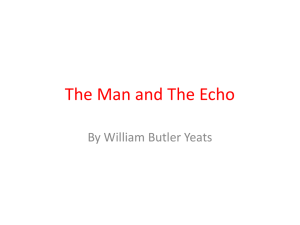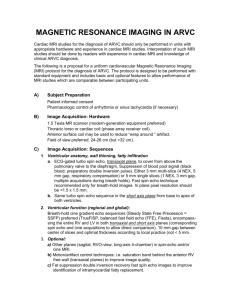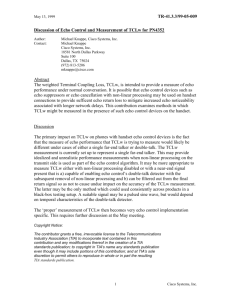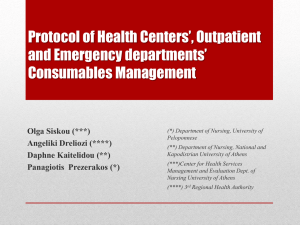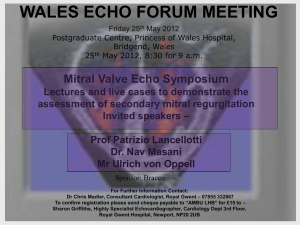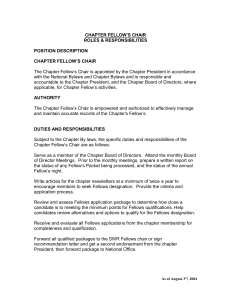Fellow Responsibilities
advertisement
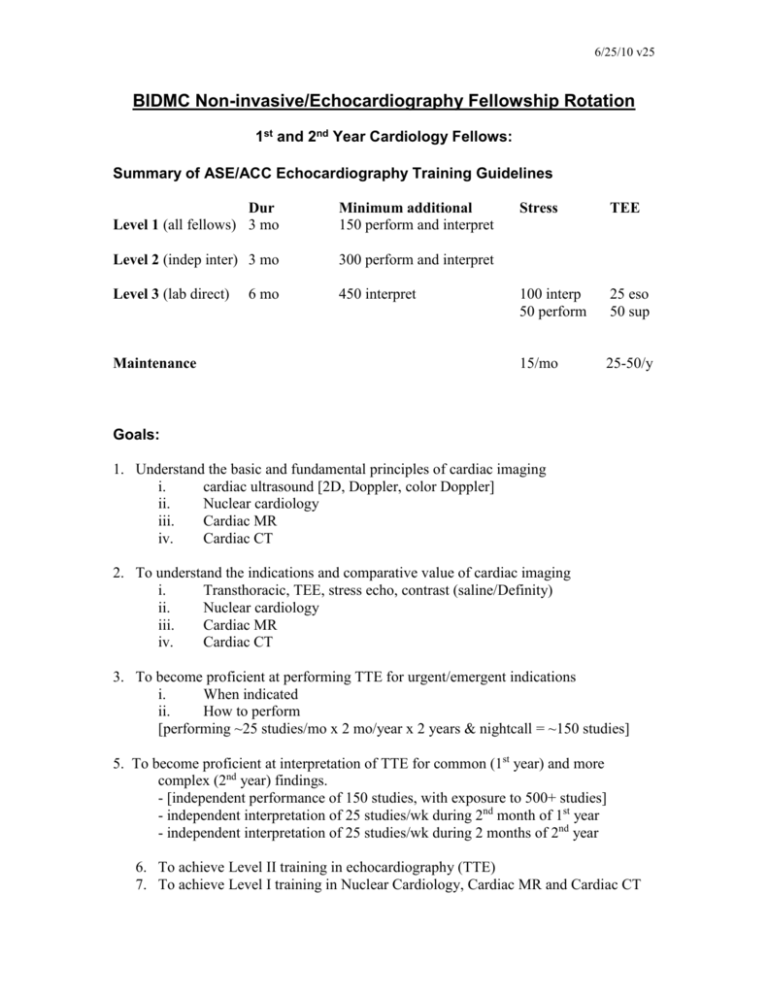
6/25/10 v25 BIDMC Non-invasive/Echocardiography Fellowship Rotation 1st and 2nd Year Cardiology Fellows: Summary of ASE/ACC Echocardiography Training Guidelines Dur Level 1 (all fellows) 3 mo Minimum additional 150 perform and interpret Level 2 (indep inter) 3 mo 300 perform and interpret Level 3 (lab direct) 450 interpret Maintenance 6 mo Stress TEE 100 interp 50 perform 25 eso 50 sup 15/mo 25-50/y Goals: 1. Understand the basic and fundamental principles of cardiac imaging i. cardiac ultrasound [2D, Doppler, color Doppler] ii. Nuclear cardiology iii. Cardiac MR iv. Cardiac CT 2. To understand the indications and comparative value of cardiac imaging i. Transthoracic, TEE, stress echo, contrast (saline/Definity) ii. Nuclear cardiology iii. Cardiac MR iv. Cardiac CT 3. To become proficient at performing TTE for urgent/emergent indications i. When indicated ii. How to perform [performing ~25 studies/mo x 2 mo/year x 2 years & nightcall = ~150 studies] 5. To become proficient at interpretation of TTE for common (1st year) and more complex (2nd year) findings. - [independent performance of 150 studies, with exposure to 500+ studies] - independent interpretation of 25 studies/wk during 2nd month of 1st year - independent interpretation of 25 studies/wk during 2 months of 2nd year 6. To achieve Level II training in echocardiography (TTE) 7. To achieve Level I training in Nuclear Cardiology, Cardiac MR and Cardiac CT 6/25/10 v25 Expectations - Practical: 1. Mornings are focused on scanning technique - how to perform TTE examinations - sonographer mentoring [Marilyn] - laminated “scan” cards - 1-2 cases/day [target of >7 cases/WEEK] - Review your clips and download study to Image Vault - ENCOR (database) listing as “scanning fellow.” - Create prelim ENCOR report for studies you scan. Save as “scanned done” so that preliminary results available (will be listed as preliminary). Be sure to indicate “FELLOW Interpretation” on the General Tab – Administration Question. - Scanning Target is >7 scanning cases during the week (1.4/day) <5 Low 5-6 Low average 7-9 Average 10-12 Very good 13-15 Excellent >15 Outstanding 2. If morning cases are not available – print/video/CD resources in Black cabinet in WEST CAMPUS sonographer room. There is an EchoPAC workstation and VCR/monitor for fellows in the room behind the WC receptionist - review Mayo Clinic series of echo instruction tape in general, tapesCDs should NOT be removed from the Echo Lab - Texts: o 2009 “Baby” Otto text will be provided to each 1st year fellow during their 1st monthly rotation: Suggested reading: 1st year/1st two rotations:: chapters 1, 2, 5-14 1st year/3rd and 4th rotations: chapters 4, 5-14 (again), 15-17 o J Oh Mayo Clinic text o Feigenbaum Echo text (advanced, but excellent reference/ DVD) o Texts may be removed (list what you have on white board) - ACC Echo-CD - Congenital Heart Disease CD - Fellow Wednesday morning PowerPoint Presentations on Echo web site 3. Suggested Focus: First Year – First and second two-week blocks Comprehension of basic cardiac anatomy pertaining to echo (Mayo Tapes, Otto chapters listed above, teaching CDs for orientation/views) Capability to recognize and obtain cardiac echo views (scanning 1-2 pts daily, target of >7 studies/wk) parasternal long axis, RV inflow, RV outflow/PValve parasternal short axis (aortic valve, mid-ventricular levels) apical four chamber, five chamber 6/25/10 v25 apical two chamber, long axis subcostal suprasternal Ability to identify structures on M-Mode and make appropriate measurements Basic knowledge of conventional and color flow Doppler Attend daily reading sessions and acquire basic interpretative skills Working knowledge of ultrasound machine Ability to triage requests for portables Assist with all portable studies Perform saline contrast PFO/shunt studies Perform Definity endocardial border definition contrast studies Familiarity with stress echo procedures (treadmill and dobutamine) First Year – second and third two-week blocks and Second Year Review of basic cardiac anatomy pertaining to echo (Mayo Tapes, Otto suggested chapters above, teaching CDs) Refine scanning skills in lab and units (target of >7 studies/wk) Ability to perform full echo/Doppler studies Attend daily reading sessions and refine interpretative skills Improve knowledge of ultrasound machine including quantification of gradients and valve areas Ability to triage, perform and troubleshoot all stress echo procedures Triage and perform portables and emergent echo studies Complete preliminary report in ENCOR 2nd Month of First Year Fellows: Week 1: Scanning with sonographer Week 2-4: More independent scanning Week 3-4 Focus on Portable studies Second Year Fellows: Focus on more complex lab studies Independent interpretation of studies 4. For each study in which you are involved as a scanning fellow (weekday/weekend): - Complete preliminary report in ENCOR (2nd mo 1st yr fellows, all 2nd yr fellows) - Confirm your name is listed as “imaging” and interpreting fellow in ENCOR 6/25/10 v25 5. Attend afternoon WEST Campus reading sessions (target of >30 cases/wk - case reviews with Echo Staff - be sure the attending lists you as an “interpreting” fellow - assist with contact for urgent/emergent interpretations - I will provide you with your reading #s at the end of the block. - Participate in >30 interpretations (7.5/day with 1 clinic session/wk) - <20 Low - 20-27 Low average - 28-32 Average - 32-40 High average - 40-49 Very Good - >50 Excellent 6. Perform saline contrast injections (inpatient and outpatient labs); including placing IVs for outpatients (if needed) 7. Prepare and perform Definity endocardial border definition contrast studies; including placing IVs for outpatients (if needed). 8. Monitor patients for dobutamine/adenosine/persantine stress echoes 9. To attend and to present at Wednesday morning conference during your echo month. (Topic is“flexible,” – related to non-invasive imaging, research, journal club, etc.). Fellows present during the 2nd month of their first year and both months during their 2nd year. 10. Echo examination – each block will be assigned 2 studies to interpret (see web) 11. Rotation review – I will meet with you on the 2nd and 4th Wednesday of the month 7:30-8:00am East Campus Library Rotation review 12. Cardiac MR case review – Required exposure to Cardiovascular MR Cardiac MR-EAST – SH-462 (CMR fellows room) 11am-noon: Tuesday 11am-noon Friday 13. Cardiac CT case review – Required exposure to CCT (Tom Hauser) Tue/Thur 2:309-3:30pm [East Campus-Ansin 3] 14. Nuclear Cardiology case review – Required exposure to Nuclear [Tom Hauser] Wednesday 9:30-10:30am (lecture – EAST Campus, Finard 1) Wednesday 2-3pm (case review – EAST Campus, Finard 1) 6/25/10 v25 15. REQUIRED Conferences: - Monday 12-1pm CMR/CCT/Nuclear conference (WC, Baker 4 library)* - Tuesday 7-7:45am Core Curriculum Lecture (WC, Farr 60 8-9am Division clinical conference (WC, Baker 4 library) 12-1pm ECG conference (WC, Baker 4 conference room)* - Wednesday 7:30-8am (2nd & 4th Wed of month) – East Card Library – WJM* 8-9am Echo conference (EAST Cardiology Library) 9-9:30am: Meeting with advanced non-invasive fellows* 9:30-10:30am Nuclear conference (EC, Gryzmich 1) - Thursday 7-8am Fellows Chief Conference (WC, Baker 4 library) - Friday 8-9am Cardiology Grand Rounds (WC, CC250 auditorium)* 12:30-1:30pm (2nd & 4th Friday of month) Case Based Noninvasive Imaging Seminar (Baker 4 library) * September-June Optional Conferences - attend Friday Firm and Tuesday M&M conferences and present echo studies - cardiac MR research conference (Tuesday noon-1pm; East CV Library) EAST/WEST Mon 7-8am 8-9am Tue Wed Fellow Conf 7:30a, Thur WJM 2/4th Echo Conf Clin Conf Fri Card GR 9-9:30 9:3010:30am 11-12pm 12-1pm Nuclear Teaching CMR/CCT/Nucl Teaching CMR ECG Teaching Nuclear 2pm 2:30pm CMR 12:30-1:30pm Nuclear Cases/Journal Club Cardiology CCT CCT 4-5pm 13. “2nd” week of rotation - Test cases provided on Wednesday (to be reviewed with WJM the following week on a day he/she is in the lab). 6/25/10 v25 - complete ENCOR report as “ORDERED” so will NOT be part of the patient’s record. - Meet with WJM 9-9:30am to review the rotation - Complete “New Innovation” NON-INVASIVE attending evaluation 15. Vacation - notify WJM (and Marilyn Riley) in advance - need to arrange coverage for saline/Definity contrast/dobutamine echo 16. On-call - off-hours (evenings after 5pm, weekends, holiday) echoes are performed by the on-call clinical cardiology fellow with back-up by the on-call TEE fellow (who performs all TEEs) and by the on-call Echo Attending. - If the echo fellow is uncertain of the interpretation, the TEE fellow followed by the echo attending should be contacted for review. - off-hours studies should be logged into the ENCOR system with the fellow listed as the performing and interpreting fellow and the attending of the following “work day” listed as the staff attending. The fellow should i. complete an ENCOR preliminary interpretation. Be sure to label as PRELIMINARY using the “emergent study by fellow” and “fellow interpretation” answers in the GENERAL TAB of ENCOR. ii. download the studies to the ImageVault. iii. Leave the sonographer prelim form in the WEST Campus reading room (including East campus studies). iv. send an e-mail to the echo attending (weekend and next business day WEST reader) and to Marilyn Riley (mriley1@bidmc.harvard.edu) that a study was done, pt name/MRN, location (e.g., floor/ICU), indication for echo, findings. - a sonographer is present from 8am-4:30pm on Saturday. They will do 7 studies. Priority is given to ICU followed by pre-discharge. Page the sonographer (Beeper #31578] for all urgent requests. - Fellows on cardiology service call for the division are excused from morning obligations in the echo lab on the day following call, and should participate in the afternoon activities.
